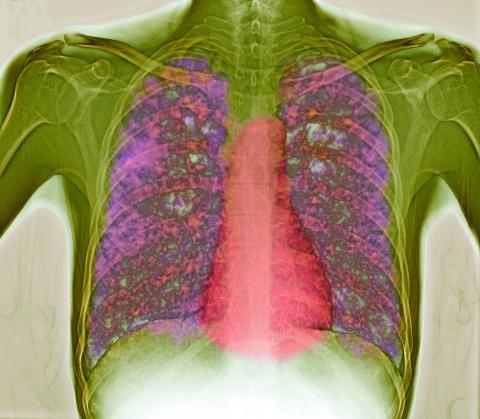Plants are more practical. They developed an evolutionary strategy to "tolerate" rather than "resist" infection to maintain health. And that may be the roadmap for tuberculosis.
Since the discovery of Mycobacterium tuberculosis, or Mtb, (the bacteria causing TB) over a century ago, great progress has been made in defining strategies that facilitate elimination of the bacteria. The discovery of antibiotics was a major breakthrough in the treatment of active TB. However, we also learned that over 90 percent of TB-infected individuals tolerate the bacteria without any treatment at all. Most people are tolerant.

Colored X-ray of a patient's chest showing disseminated, or miliary, tuberculosis (TB) in the lungs and if left untreated, it has almost 100 percent mortality rate. Credit: DU CANE MEDICAL IMAGING LTD/SCIENCE PHOTO LIBRARY
If we want to panic people or get more government money, we can claim 25 percent of the world's population has this "latent tuberculosis", a killer waiting to strike, like the U.S. Centers for Disease Control has attempted to do in creating "pre-diabetes", but the more positive approach is to see why some people tolerate it so well - and how that can help the rest. Widespread drug resistance to various Mtb strains the limited pipeline of effective antibiotics and the lack of an efficient vaccine. New antibiotics are unlikely given that politicians want them to be sold for a dollar and the public want them to be generic upon invention.
A fix isn't as obvious as it sounds. A new paper found that having excessive levels of T cells, which are known as soldiers of our immune system, could cause more harm than good. Which is either important or a sign that their study is flawed. The authors determined that a protein in the mitochondria called cyclophilin D (CypD) acts as a key checkpoint for T cell activation but increasing T cell activation in mice by eliminating a metabolic checkpoint unexpectedly compromised host survival without any impact on the growth of Mtb.
Citation: Fanny Tzelepis, Julianna Blagih, Nargis Khan1, Joshua Gillard, Laura Mendonca, Dominic G. Roy, Eric H. Ma, Philippe Joubert, Russell G. Jones, Maziar Divangahi, 'Mitochondrial cyclophilin D regulates T cell metabolic responses and disease tolerance to tuberculosis', Science Immunology 11 May 2018: Vol. 3, Issue 23, eaar4135 DOI: 10.1126/sciimmunol.aar4135






Comments